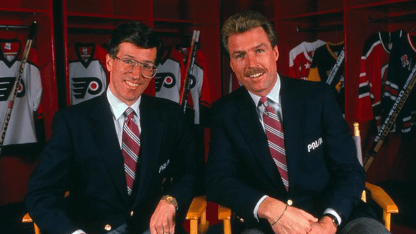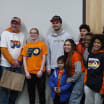It is strictly a coincidence that legendary broadcaster Mike "Doc" Emrick, who had a Ph.D. in communications and could easily have a second in the history of professional sports, announced his retirement on the 53rd anniversary of the Philadelphia Flyers' first game at the Spectrum. It was, nonetheless, apropos.
Doc's Philadelphia Story
Emrick got his first opportunity to be an NHL broadcaster in Philadelphia after serving for three seasons as the play-by-play broadcaster and public relations director for the AHL's Maine Mariners

Emrick got his first opportunity to be an NHL broadcaster in Philadelphia after serving for three seasons as the play-by-play broadcaster and public relations director for the AHL's Maine Mariners; the Flyers' farm team at the time. Emrick worked for three seasons as a Flyers broadcaster for Prism (the local sports and movies channel founded in 1976 by Ed Snider). From 1982-83 until 1992-93, he worked on the team's UHF telecasts as well as getting his earliest national TV exposure.
"I recall my years with the Mariners and Flyers very fondly," Emrick told NHL.com in 2007.
"Professionally, it was a tremendous honor to be associated with the organization. The parent team was a perennial Stanley Cup contender, with a passionate fan base. The Mariners won back-to-back Calder Cup championships the first two years. I learned a lot, and I had a great time with the Mariners and Flyers. On a personal level, I met so many wonderful people. Many treasured friendships, with some who are no longer with us and others who remain among my dearest friends, were forged in those years."
From 1988-89 through the remainder of his tenure, Emrick served as the Flyers' television play-by-play broadcaster. In a city that learned the game of hockey from legendary broacaster Gene Hart, a Foster Hewitt Award winner (sometimes called the "broadcasters' wing" of the Hockey Hall of Fame), Emrick himself began to craft a legendary legacy. He did so by simply being himself.
During his years as the Flyers' TV broadcaster as well as in national broadcasts, Emrick worked extensively with color commentator Bill Clement. The two forged instant chemistry in the booth, and a close friendship outside of hockey.
"As brilliant as Doc is and was, when we were partners, he never seemed to have an ego. The 'show' always came first and that's why he was such an incredible teammate. Doc is a born giver. When I think of friends who truly stand for something of value, he is at the top of the list," Clement said.
Through the years, Emrick has been an inspiration and mentor to broadcasters to scores of young announcers with aspirations of breaking into the business or who were in the early stages of their careers. Emrick has always viewed this as paying forward what had been done for him.
"My biggest early influence and inspiration is Bob Chase," Indiana native Emrick said in 2007, referring to the Fort Wayne Komets broadcaster, who had a 63-year career of calling games for the same minor league hockey team until Chase passed away at age 90 in November 2016.
"I didn't have the pleasure of listening to Foster Hewitt on Hockey Night in Canada when I was growing up, but I was fortunate to grow up listening to Bob Chase. He later became a mentor to me, critiquing my broadcasts and providing encouragement."
One of the broadcasters whom Emrick himself later helped along the path to success is Jim Jackson, who began doing Flyers radio broadcasts in 1993 and has been the team's television play-by-play broadcaster since 1995-96.
"When I was a young broadcaster in Utica, I marveled at how outstanding and unique Doc was as a broadcaster. To me, he's the G.O.A.T. in our industry, which is to take nothing away from the many great voices of the game. Doc's timing, his enthusiasm, knowing when to talk and when to let the crowd tell the story, his obvious love for the game and his work; he's truly one of a kind," Jackson said.
In 1993, after Emrick moved on from the Flyers, he took the new play-by-play man, Jackson, out to lunch and shared some of the wisdom he'd gained from 13 seasons of broadcasting in Philadelphia and 16 years of working with the organization.
"Mike didn't have to do that, but it speaks to the kind of person that he is. He gave me the lay of the land, and some on-the-mark pointers about what makes Philadelphia sports and the Flyers fans unique. Over years since then, working with Mike as a colleague when I would see him at various buildings doing prep for national broadcasts, I gained an even deeper appreciation for the person and the broadcaster. Mike not only has phenomenal talent but he also worked very hard at his craft, and treats everyone he meets with the same kindness," Jackson said.
One of the most enduring friendships that Emrick forged during his years with the Mariners and Flyers was with Bruce "Scoop" Cooper, who served alongside Hart and then Emrick as a broadcast statistician and researcher. Even long after he moved on to full-time national work, Emrick often requested that Cooper work in the booth with him for games in Philadelphia.
"I will surely miss never being able to share a broadcast booth with Doc again as I have done so very many times over the past 43 years, but I know that our friendship is eternal and for me my most treasured one in hockey -- and in life too for that matter
"I will never forget meeting Doc for the first time in the Spectrum pressbox before a preseason game during the Flyers and Mariners 1977 training camp. Doc had just been hired to be the first broadcast voice for the Mariners farm club for the Flyers and we instantly became friends. Over the 43 seasons since we have spent thousands of hours together both at the pond and elsewhere as well as countless more on the phone," Cooper said.
"Besides sitting to his left in NHL and AHL broadcast booths with him hundreds of times over the years doing stats, I was also with Doc in Maine in 1977 on the day he and his wife Joyce Anne became engaged as well as being his guest at the 2004 Lester Patrick Award luncheon in New York sitting next to Morris Snider, his first boss as GM of the IHL Port Huron Flags, when he and his long time broadcast partner, John Davidson, were both presented with that great honor.
In honor of his friend, Emrick sometimes slipped into his broadcasts inside jokes or references geared specifically to Cooper as he watched the telecast from home. When Doc dropped in a nod to Fawlty Towers, Monty Python, the Maine Mariners or the Philadelphia Firebirds, the aside was often intended for Cooper.
"Doc always checked his messages during commercial time outs and would respond quickly with glee to my message confirming its recognition," Cooper recalls with a chuckle.
Although best known for broadcasting hockey, Emrick called many different sports over the years, including NFL football, baseball, Olympic water polo, lacrosse, NCAA March Madness basketball and other events. In hockey, he is a member of the Hockey Hall of Fame (Foster Hewitt Award), the United States Hockey Hall of Fame, and a recipient of the Lester Patrick Award (service to the sport in the United States).
Emrick served as a longtime member of the Hockey Hall of Fame selection committee. It was in this capacity in which he was instrumental in successfully building committee support for the belated induction of longtime Flyers star defenseman Mark Howe (whose games Emrick called) and the posthumous selection of two-time Stanley Cup winning coach Fred Shero.
"Mke was the one who got the ball rolling for my candidacy for the Hall of Fame," Howe said in 2017. "That's something that is pretty humbling and something I greatly appreciate."


















